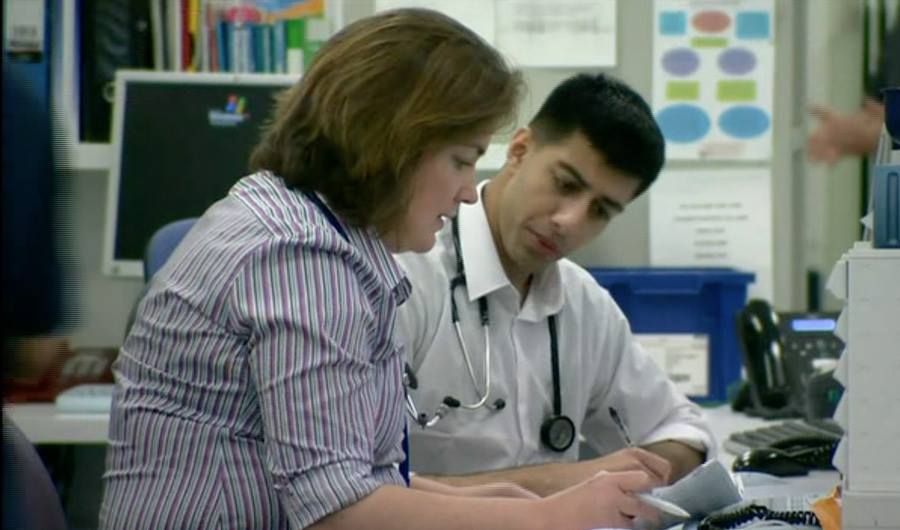
May 25, 2022, by mszrm4
Spotlight on “Teaching Clinical Reasoning”
Dr Nicola Cooper discusses teaching clinical reasoning on the MedEd Masters at Nottingham
Our postgraduate diploma in medical education has a number of optional modules including technology-enhanced learning; underperformance and performance enhancement; coaching, mentoring and supervision; applying psychometrics in assessment; and teaching clinical reasoning.
Teaching clinical reasoning is a hot topic among medical educators – not only because it is fundamental to clinical practice, but because errors in reasoning (mainly failure to synthesise all the available information correctly) are thought to be responsible for the majority of diagnostic errors. Diagnostic errors tend to occur in common diseases and diagnostic error is a significant cause of preventable harm worldwide (1)(2). A number of influential reports, including from the World Health Organisation, have focused on the problem of diagnostic error and diagnosis education (3). There are international calls for curricula to explicitly address teaching in the diagnostic process using evidence-based educational approaches.
But hang on a minute – don’t medical schools teach clinical reasoning already?
Well, undergraduate medical curricula provide instruction in the basic elements of the diagnostic process, for example taking a history, performing a physical examination, and generating a differential diagnosis. However, clinical reasoning education tends to be implicit and ad hoc: ‘The field cannot rely on clerkships as a breeding ground for this skill. The variety of cases offered to students is simply too limited, and the provision of coaching and feedback too haphazard … Medical educators need to do more and in a more systematic fashion.’ (4) There is a growing consensus that medical schools and postgraduate training programmes need to teach clinical reasoning in a way that is explicitly integrated into the entire curriculum. This does not require additional teaching time, rather a specific approach to teaching.
A small number of UK medical schools (e.g. Manchester) have already developed an explicit longitudinal clinical reasoning curriculum. Even more are starting to discuss and plan how they are going to do this. Each school faces a key challenge: faculty development – how to teach a large number of clinical teachers the required knowledge and skills to teach clinical reasoning based on up-to-date evidence. The UK Clinical Reasoning in Medical Education group (CReME) is a registered charity that exists to promote excellence in teaching clinical reasoning in medical education and to provide high quality resources for teachers and learners (5) (6).
CReME holds conferences and workshops and recently hosted some online meetings at which the majority of UK medical schools were represented. The discussions focussed on teaching, curriculum, assessment and the challenges of faculty development. As chair of CReME, I am regularly asked to speak to faculty at medical schools in the UK and abroad about how to teach clinical reasoning and integrate clinical reasoning education in to an undergraduate curriculum.
Scholars on our teaching clinical reasoning module get the very latest research-informed material on topics including:
• What is clinical reasoning and why does it matter?
• How does expertise in clinical reasoning develop?
• If we look at teaching through a clinical reasoning lens, what would we teach?
• What does the literature say about how we should teach?
We also focus on case-based learning (in the classroom and in clinical environments), and recap on material learned in previous modules, such as the evidence on what makes feedback effective for learning, and cognitive load theory. Our last cohort fed back that they found the module ‘excellent’ and ‘thought-provoking’. It also has the interesting side effect of helping clinicians improve their own clinical reasoning as well.
People often assume that Nottingham has an explicit integrated clinical reasoning curriculum when I meet them. Alas, no. But we have a growing number of clinicians with the interest and expertise we need right here. I hope it will not be too long before we join other UK medical schools in addressing this fundamental area of medical education.
Dr Nicola Cooper is Clinical Associate Professor in Medical Education, Module convenor: “Teaching clinical reasoning” and Chair of the UK Clinical Reasoning in Medical Education group (CReME)
Join us on the Nottingham MedEd course: https://www.nottingham.ac.uk/pgstudy/course/taught/medical-education-mmedsci
If you’d like to know more, we have two LIVE ONLINE, 1 hour long sessions planned in the next few months:
- Wednesday 15th June 5pm BST
- Wednesday 17th August 12noon BST
Email ms-pgt-admin@exmail.nottingham.ac.uk to book your place
References
1. Gunderson CG, Bilan VP, Holleck JL et al. (2020). Prevalence of harmful diagnostic errors in hospitalised adults: a systematic review and meta-analysis. BMJ Qual Saf. DOI:10.1136/bmjqs-2019-010822.
2. World Health Organization. (2016). Diagnostic errors. World Health Organization. [accessed Aug 2020]. Available from: http://www.who.int/iris/handle/10665/252410.
3. National Academies of Sciences, Engineering, and Medicine. 2015. Improving diagnosis in health care. Washington (DC): The National Academies Press. DOI:10.17226/21794
4. Schmidt HG & Mamede S. (2015). Teaching clinical reasoning: a narrative review and a proposal. Medical Education; 49: 961-973
5. www.creme.org.uk
6. Cooper N, Bartlett M, Gay S et al. (2021). Consensus statement on the content of clinical reasoning curricula in undergraduate medical education. Medical Teacher; 43(2): 152-159 (open access)
No comments yet, fill out a comment to be the first

Leave a Reply